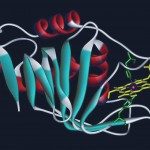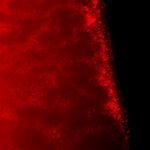Lien vers Pubmed [PMID] – 24561230
Lien DOI – 10.1016/j.antiviral.2014.02.006S0166-3542(14)00049-7
Antiviral Res 2014 May; 105(): 8-16
The family Flaviviridae comprises several major human pathogens including hepatitis C virus (genus hepacivirus), yellow fever virus, West Nile virus and dengue virus (genus flavivirus). Flaviviridae genomes comprise a single-stranded RNA segment encoding a single polyprotein that is subsequently processed into 10 mature viral proteins. The nonstructural proteins are released from the C-terminus of the polyprotein and contribute to the infectious cycle by forming membrane-bound, multi-protein compartments within host cells, named the replication complexes, where synthesis of new viral genomes takes place. Two nonstructural proteins are endowed with multiple enzymatic activities and represent important targets against which specific antiviral inhibitors have been developed. X-ray crystal structures of these viral enzymes as well as in-depth understanding of the molecular basis of their activities have contributed tremendously to the development of antiviral compounds, currently approved or in advanced clinical trials for hepatitis C treatment. One of the prime targets is the RNA-dependent RNA polymerase (RdRp, NS5B for hepatitis C virus, NS5 for flaviviruses). Here we review current knowledge of the structural basis for viral RNA synthesis by NS5B and NS5. These data offer perspectives for further drug design and constitute major advances in our basic understanding of viral RdRp. They thus point to future research directions in the field.


